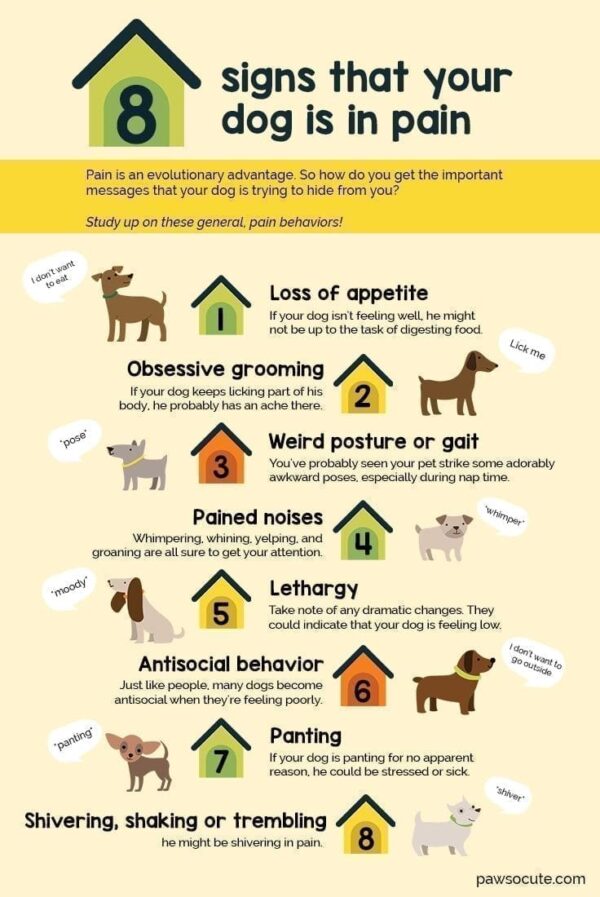
When a dog is hurting, we feel their pain, too! Pain can be a temporary or longterm condition. Either way, dog parents want to know how to safely and effectively soothe their dog’s suffering and relieve their pain. That’s why one of the most common questions that dog parents research is, “What can I give my dog for pain?”
The last thing any pet parent wants is to make a painful situation worse by giving their dog a medication that can cause them harm. Keep your dog healthy and relieve their pain by administering medications that are both safe and effective for your furry friend.

Signs that Your Dog is in Pain
Dogs experience a wide range of pain from a variety of sources, just like humans. Acute pain can happen after an injury or trauma. This pain can be extremely intense in nature and lessens over time as the wound or injury heals.
Chronic pain is a long term problem that stems from an underlying medical condition. The most common cause of chronic pain in dogs is arthritis. Chronic pain in dogs can be very difficult for dogs and their humans. It has a hugely negative impact on the quality of life. Dog parents are eager to find safe solutions to make their dogs more comfortable despite chronic conditions.
Dogs can be very secretive when it comes to pain. They hide their pain very well, making it tricky to recognize. This leads to many dogs enduring pain for much longer than necessary. Knowing what subtle signs to look for can help address your dog’s pain faster.

What is an NSAID, and Can I Give it To My Dog for Pain?
NSAID is an acronym for a group of medications that are “Nonsteroidal Anti-Inflammatory Drugs,” or NSAIDs. Humans commonly take them for discomfort related to inflammation, such as arthritis in the joints or common headaches. Humans also turn to them for fever reduction and to reduce swelling from injuries.
Dogs should ONLY take NSAIDs made for dogs, not those made for humans!
Dogs do not tolerate human formulations of anti-inflammatory drugs. In most cases, they are dangerously toxic to dogs. They can cause kidney, liver, or digestive problems. Thankfully there are plenty of NSAIDs designed especially for dogs. Talk to your vet about NSAIDs such as:
- carprofen (Novox or Rimadyl)
- deracoxib (Deramaxx)
- firocoxib (Previcox)
- meloxicam (Metacam )

Signs a Dog is Having a Reaction to NSAIDs for Dogs
It is crucial to monitor your dog anytime they start a new medication. NSAIDs for dogs are generally safe. However, dogs can have a bad reaction to an NSAID, just like a human can. This is true even for NSAIDs that are made specifically for dogs.
Pet Web MD shares the acronym BEST as an easy way to remember the signs you may see in a dog that is having a bad reaction to an NSAID. If you see any of the warning signs listed below, contact your vet.
- B: behavior changes
- E: eating less
- S: skin redness or scabs
- T: tarry stools, diarrhea, vomiting
Can I Give My Dog Ibuprofen for Pain?
No! You should never give your dog the human medication ibuprofen for pain. This drug, found in Advil and similar products, is not formulated for dogs and can have many adverse health impacts on dogs. Ibuprofen poisoning is very common and can result from minimal doses of the drug.
Instead of leaving the body as it does in humans, ibuprofen recycles through a dog’s liver repeatedly. This leads to ibuprofen poisoning. Ibuprofen poisoning affects multiple systems in a dog’s body and can cause a variety of symptoms.
Gastrointestinal problems such as decreased appetite, vomiting, diarrhea, and other stool disruptions, depression and abdominal pain are common. More severe cases can result in organ-system failures, seizures, and coma.

Should I Give My Dog Acetaminophen for Pain?
No! Acetaminophen is the active ingredient found in Tylenol and similar medications. Acetaminophen should not be given to dogs. It’s toxic to dogs and can result in death after a single dose. Small dogs and puppies are at especially high risk.
Symptoms of acetaminophen toxicity can appear within 1-4 hours of ingestion but can take far longer to present. Early detection and treatment are key to recovery. The prognosis becomes worse and worse for dogs the longer the acetaminophen has been in the system untreated.
Dogs with acetaminophen toxicity may have methemoglobin in the body. This disturbs the body’s ability to deliver oxygen to various tissues. Dogs may appear blue around the eyes and gums. Fluid retention may be found in the face, paws, and limbs. VCA Hospital says, “The presence of methemoglobin in the blood demands a prompt diagnosis, hospitalization, and aggressive care.” Best to avoid this altogether by avoiding acetaminophen.
Can I Give My Dog Naproxen for Pain Relief?
No! Do not give your dog Aleve or similar medications. Naproxen is extremely toxic to dogs. The Pet Poison Hotline reports that “While safe to use for humans, naproxen is very poisonous to dogs and cats, as it has a narrow margin of safety (which means it is very potent). As little as one 220mg tablet can cause severe symptoms (even death), even in a large dog.”
Naproxen ingestions can lead to ulcers in the gastrointestinal system of your dog. These can rupture, causing tears in the intestinal tract, which can be very painful and dangerous. Naproxen ingestion can also lead to kidney failure. Naproxen is not a safe choice to treat pain in dogs.

How About Giving My Dog Aspirin for Pain?
Yes, dogs can take aspirin but only with guidance from a veterinarian. Aspirin can be safe for dogs, but it’s critical that you administer an appropriate dosage. Talk to your vet before giving your dog aspirin. They will know how much and how often you should give your dog aspirin for pain.
The American Kennel Association says that aspirin is technically safe for dogs, but it’s not entirely risk-free. You should consult with your vet first. The AKC reported, “Thanks to some of the more serious side effects associated with the drug, aspirin is not a medication that owners should give their dogs without veterinary approval, so be sure to pay close attention to your veterinarian’s instructions.”
Other Medicines for Dog Pain Relief
There is a litany of prescription medications available to your dog for pain. You need a prescription from your vet and should always follow the label instructions for dosage. As mentioned above, some of these are classified as NSAIDs. NSAIDs for dogs are usually prescribed to deal with chronic pain, such as arthritis. They include: carprofen (brand-names Novox or Rimadyl), deracoxib (brand-name Deramaxx), firocoxib (brand-name Previcox), and meloxicam (brand-name Metacam).
Dogs who have advanced or more severe arthritis and inflammation or severe allergies may be prescribed corticosteroids. These drugs can be very effective but come with some potential long-term complications. Discuss this with your dog’s vet before using corticosteroids.
Acute pain is typically handled with a different class of drugs. Injuries and post-surgical recovery may require an opioid prescription, which is also used for terminally ill dogs and cancer patients. These drugs are just as potent for dogs as they are for humans, which is why they are only used in particular circumstances.

Natural Pain Relievers I Can Give My Dog at Home
Pet parents around the globe have embraced the use of CBD for pain management in dogs. It can be incredibly helpful for dogs with arthritis and other chronic conditions. There is a growing body of scientific evidence about CBD use in dogs. Every account points to it being a safe, effective, and natural defense against a multitude of problems, including pain.
Please see our beginner’s guide to CBD use here!
There are endless accounts of dogs who have benefitted from CBD products made specifically for dogs. We shared this story about River, a dog whose hip pain made every movement excruciating. After taking Cannanine CBD tincture for a couple of weeks, River had the zoomies for the first time ever. People swear by it. If your dog is in pain, consider trying a high-quality CBD tincture made especially for dogs, such as Cannanine.
We get it. There is nothing worse than when your baby is in pain. If your dog is in pain, especially outside of your vet clinic’s normal hours, you may feel tempted to give them something from your medicine cabinet. This can be very dangerous for your dog. Please consult with your vet before giving your dog any medications for pain relief.
The post What Can I Safely Give My Dog for Pain? appeared first on iHeartDogs.com.
from iHeartDogs.com https://ift.tt/31AvGTJ https://ift.tt/3lrMm7R

No comments:
Post a Comment